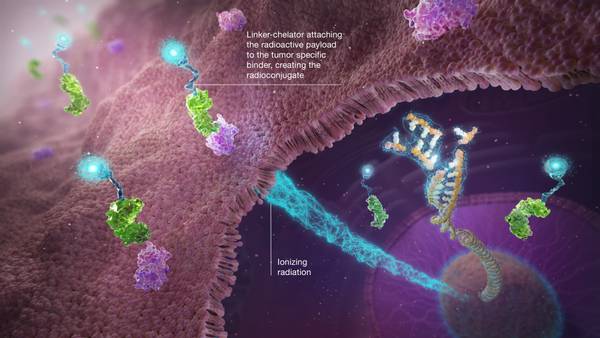Predictive in vitro Assays for Kidney Retention by Radioconjugates
Opportunity types being sought:

The field of targeted therapeutic radioconjugates is rapidly expanding, promising significant advancements in cancer treatment. In contrast to antibodies, radioconjugates benefit from shorter half-lives, minimizing radiation toxicity to healthy tissues. With a focus on binders of low molecular weight (< 50 kDa), such as small molecules, peptides, and antibody fragments, these radioconjugates demonstrate rapid renal clearance, albeit with an increased likelihood of elevated kidney retention based on their physicochemical characteristics.
AstraZeneca has assembled a diverse library of radioconjugates incorporating different binders, linkers, and chelators, yet assessing in vivo kidney retention via biodistribution studies can be time-consuming and resource-intensive. AstraZeneca is seeking high-throughput in vitro technologies to predict kidney retention, enabling the screening of radioconjugate libraries through in vitro cells or organoid models before proceeding to in vivo mouse biodistribution studies.
Proposed solutions to this Challenge should meet the following Solution Requirements to be considered for funding.
- Researchers must have the capability to carry out the work proposed (i.e. The research plan cannot be hypothetical in nature) and a statement of expertise and/or any facilities that will be used to execute the proposal must be provided. Upon selection, the researcher must be able to begin the project immediately.
- Researchers must have experimental proof-of-concept data description of the proposed methods for developing the model(s), and evidence that demonstrates the feasibility of the approach. The proposal must also contain proof of concept predicting kidney retention using at least six different reported and published radioconjugates.
- The selected collaborator will receive at least six known radioconjugates to confirm the kidney retention ranking in a blinded study.
Low throughput and time-consuming predictive assays not amenable for evaluating multiple radioconjugates in-parallel are out of scope.
Submission Information and Opportunity for Collaboration
AstraZeneca invites applications from both academic and biotech organizations, and encourage proposals based on existing technologies or methods. Applicants should complete the submission form including a brief, non‑confidential overview of your proposal, demonstrating how the challenge requirements are satisfied by your approach. To submit your proposal, please visit our website, register, and submit your application form under the appropriate Connect campaign.
CoSolve Sprint program: Through CoSolve Sprint, as part of the global Open Innovation programme, AstraZeneca seek to engage in collaboration with researchers from academia, start-ups and early stage biotechs to crowdsource solutions for their R&D CoSolve Sprint challenges. Together, they aim to expand their problem-solving ecosystem and fortify the groundwork for the next wave of breakthroughs in drug discovery and development. With CoSolve Sprints, AstraZeneca is in search of developed ideas that can be transferred as solutions to address their scientific objectives. A collaboration agreement will be put in place for selected applicants.